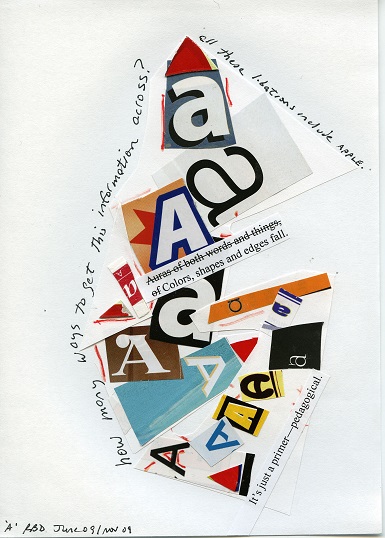
fromDraft 98: Canzone
After the experiences spoken of already, after I found that the luminous bit of phosphorescence in the dark room was a bug, pulsing blue, I wanted to show how these data are vectored. Yet even the lyric may trip and fall unwitting into brambles. Do I need again to prove myself vertiginous? I now open the book backward, as if shifting poles, and pass into a mirroring account of alphabets. Every off chance is the index of what has already been articulated, opening onto the same scrubby field. The master poet trembled. People watched him and wondered. He could barely articulate one shuddering, shattered word, but struggled, shaking, and thereby achieved exactitude and bearing. As for me, years later, I stumbled through a cracked gate, scarcely knowing why and how I was brought to this place. Its ownership in fact was common property, though at first it had seemed fenced off—Vietato l’ingresso. People watched me and shrugged. However, having finally come here, to an open book, I thought it plausible to write of the intersections, so that others might recognize their fate in mine as well as mine in theirs. Hence I composed a canzone that begins “I carried my soul the other night.”
Reject the whole that someone claims is rule.
A hole, a line, a hold, a lie, a hope,
a hype will slide you through this most dangerous spot.
Resist only rectitudes, resist the crazed
and driven knowers. Find and replace.
Though the mechanism to depict this is
called documentary, still it needs the stinging
pulse of lines. This matches that.
All “ofness” exists
for much more Of.
The beyond moves to two places: here and there.
To achieve connection,
is there just one route of passage?
There is not.
This canzone is divided. What is the method in such a song? How was the evidence for this police report assembled? The first part is the first, and the way it begins is repeated variably—“I carried my soul.” This is insistent. The second part is the second, and very short—there is no particular need for balance except as this part pivots between two units of three each—and begins “You will have … to share.” The third fissions and fissures (“I was struck by this lightning”) so that it becomes impossible to follow and, as was already intimated, gets caught in its own cross-hatches and brambles. These divisions offer quixotic gestures at best, hardly a tribute to my powers of construction, but rather to my sense of being overwhelmed. For saturation in the material is so great that to speak of controlling this experience, or of dividing the representation presents no more than a temporary artifice or stay against the world as such. Truly to say what is here still to be said, I would have to divide, but also to multiply the poem again and again, aphorism after aphorism. What is its argument anyway? When this canzone became known—was there a backstory to this? was I ever in the anthologies?— a friend asked me what my definition of OF was.
We are still working without a contract. There is a continuous, often weaseling use of the word “challenge” whenever policy is being discussed. Tying up tomatoes is on my list for today. She still has the tattoos from where her head was held en pointe for the radiation beam to be directed. I fear continually that I will not finish what I define as “my work,” so I keep adding other tasks and possibilities, doubling already doubled poems, for example, which is, to speak perfectly frankly, an obvious and transparent strategy. If you start “deepening content knowledge in reading,” you might end up reading between the lines. Then between those and other, secret lines. I would like to give you this small piece of string.
Afterward, I could perhaps write interstitial poem after poem, filling gaps that have opened and that exist (have in fact always existed) between every single word, obliterating the work until it is one over-written, unreadable, but theoretically conceptual and thus critically consumable textual object whose laws and rules have, over time, become superstructure. Or I could refuse to. Afterward, I could begin again backwards, moving from the end to the beginning. “Awful literal these words.” And many others. Act as if you felt the lines of force, the connections. Act because you felt them. Rescue children—even if there is no guarantee. Of their future. Of anything. The person is a pinhole through which the whole community beams and takes itself into its own arms, camera oscura images projected, dancingly, upside down; their melancholy, their intersections, their humor, their charm, all cross and link, but sometimes don’t. Vita nuova. We hold each other and apart. This part commences here.
June-July 2009


No comments:
Post a Comment